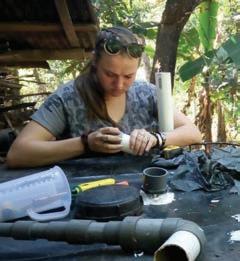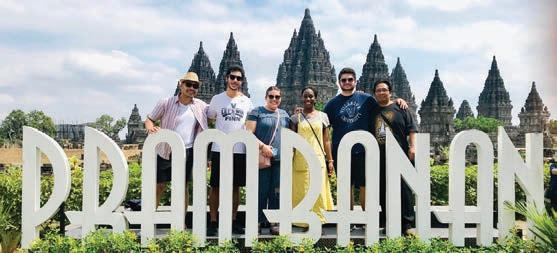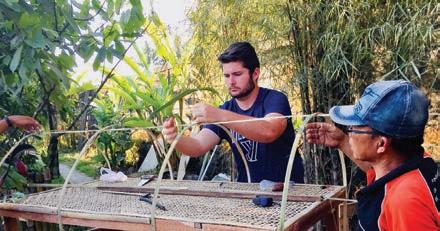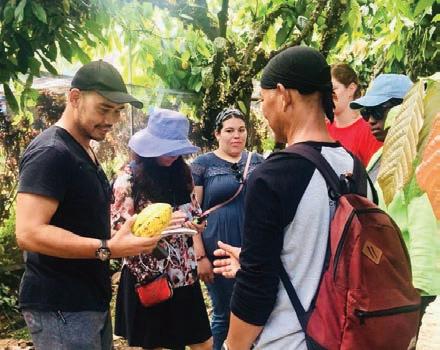
5 minute read
LESSONS IN SUSTAINABILITY IN INDONESIA
LESSONS IN SUSTAINABILITY IN INDONESIA
When Jakarta, Indonesia-native Justinus Satrio, PhD, was awarded a scholarship to pursue his college education in the United States, he chose to study in Iowa. “I thought since it was in the middle of the country it would be close to everything,” he explains. While the location did not meet his expectations where ease of traveling was concerned, Iowa did turn out to be the ideal setting to begin research into biofuels, a topic that bloomed while he was a student. Today, as an associate professor of Chemical and Biological Engineering at Villanova University, Dr. Satrio puts his education and experience to work in the lab, classroom and field—both here in the United States and in his home country.
In the College of Engineering, in addition to teaching traditional chemical engineering courses, Dr. Satrio teaches courses in biomass conversion and sustainable development and leads undergraduate and graduate student researchers in his Biomass Resources & Conversion Technologies laboratory. His interest lies in the development of processes that utilize bio-renewable materials for producing energy, fuels and chemicals to reduce society’s reliance on non-renewable carbon sources.
In 2017, working with Villanova’s Office of Education Abroad and Villanova Engineering Service Learning, Dr. Satrio launched a summer program that combines his passion for sustainability with his love for Indonesia, which is rich with biomass resources and is rapidly growing in terms of population, economy and innovation. The program gives Villanova students the opportunity to experience living in Indonesia while doing research and taking part in service internships on topics related to the agroindustry. The key to the program’s success has been a collaboration with Bogor Agricultural University in Bogor, West Java province, the country’s leading institution for the study of agriculture and forestry.
This past summer, six College of Engineering students— representing Chemical, Civil, Mechanical and Sustainable Engineering—traveled with Dr. Satrio to Java and Bali, Indonesia, for a six-week experience in “Sustainable Engineering for International Development.” The program began with an internship with PT Swen Inovasi Transfer in Bogor, where the students learned about biogas technologies and integrated farming. It was followed by a two-week summer course at BAU on Sustainable Agroindustry for Rural Communities, which was attended by 21 students from six countries. Students were taught process fundamentals at BAU’s campus in the first week, followed by a field study in Baturraden, Central Java, where they learned—hands on—the production of clove and patchouli oils, from plant production to the oil extraction processes. After the course, students traveled to Bali to intern with Cau Chocolates, where they worked with the company in improving the sustainability of cacao production and processing. Last year, a solar drying system for cocoa beans become a senior capstone design project for Mechanical Engineering students. The solar dryer prototype was tested by students during this visit and they subsequently proposed design improvements.
At the end of the internship, Villanova Engineering students returned home to the United States, while Dr. Satrio stayed behind for another two weeks to participate in Indonesia’s annual international conference on biomass, in which he plays a leading role. Working with BAU, Dr. Satrio has planned the 2020 Indonesia summer course-internship program, which he hopes will include the participation of Villanova science students in addition to engineering majors and students from other US universities.
When asked about the overarching goal of the program, Dr. Satrio explains that while the academic objective is for participants to learn the concepts and engineering approaches to sustainable design and development around the water, energy and food nexus in the developing world, the Indonesia program also benefits students in more abstract ways. “It calls on them to develop cultural fluency, flexibility, adaptability, humility, patience and an ability to listen to others when addressing global issues,” says Dr. Satrio. “I want to immerse them in this culture and allow them to explore. When less is dictated and there’s not one correct answer, students rise to the occasion and put the pieces together themselves.”
He adds, “Given its diversity and incredible growth, Indonesia is a good place to help the University produce graduates who possess global perspectives and an informed respect for the differences among peoples and cultures.”
STUDENT REFLECTIONS:
Mackenzie Bowden ’18 ChE, ’20 MSSE
While hands-on engineering experiences offer significant educational benefits, the personal connections developed while participating in these projects provide unparalleled benefits for social and emotional growth and well-being.
This trip provides a structured experience for students to expand their horizons and step out of their comfort zones, all while strengthening their knowledge of both engineering and the world.
Daniel Grover ’20 ChE
I learned that to accomplish anything worthwhile, it is important to have patience and motivation. Our purpose in Indonesia was to develop and install a drying system for their cocoa beans as part of the chocolate-making process, while looking for ways to improve sustainability. While we can draw up the designs and try to think of everything that could go wrong from a distance, you have to be in the field to witness factors that affect your plans.
Myah Massenburg ’20 ChE
While language can be a barrier between people, hands-on activities and learning through interactions are meaningful and powerful. I learned so much without ever exchanging words. I learned that family is important whether that be a traditional family or friends one has traveled with. A close-knit community will allow any idea or project to succeed because there are many people working diligently together. I recommend this experience to anyone looking for a challenge outside the classroom where you can directly see how projects and ideas will impact people’s lives.
INDONESIA BY THE NUMBERS
264,000,000 Population
300 Recognized ethnic groups
583 Languages and dialects
17,508 Islands
16 World economic ranking (2018)
7 Projected economic ranking (2030)

Mackenzie Bowden ’18 ChE, ’20 MSSE modifies the design of an existing anaerobic digester during a 2017 trip to Tiron, Indonesia.

The 2019 international summer course at BAU included 21 students from six countries.

Dr. Satrio and students visited Prambanan temple in the Special Territory of Yogyakarta, which is the center of a Javanese monarchy and traditional cultures.

Anthony Martucci ’22 ChE worked with Cau Chocolates’ technician in building a solar dryer for cacao beans.

Dr. Satrio (left) and the students visited a cacao farm to learn about cacao trees and fruit production.









